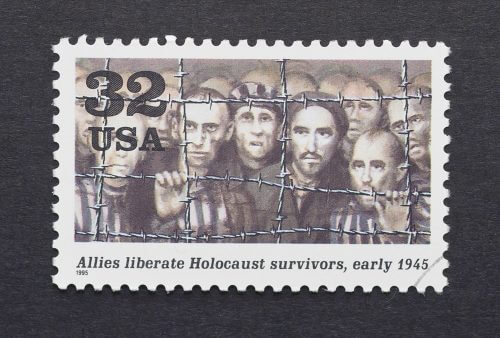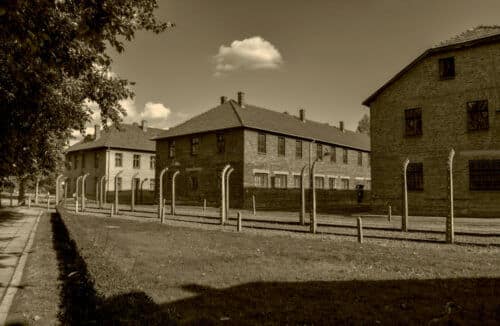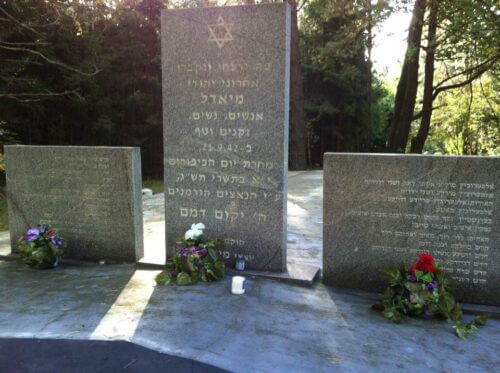This is according to a report published by the Academy of Sciences, the surveyor published the state of the field of Holocaust studies in the research universities and colleges in Israel * Following the "Acquittal of the Poles" affair, the Academy of Sciences hopes that researchers will not allow different governments to change history

Holocaust studies is an important field of research and, as we have seen in the last year, also an explosive field. It turns out that the level of Holocaust studies is not a high priority, like all the social sciences and the humanities, but specifically this field is tainted by politicization, mainly by the influence of foreign governments, as we saw in the case of an anonymous committee that acquitted the Poles of being part of the Holocaust on the grounds that they were occupied by the Germans themselves, when there are a number A wealth of evidence proves that Poles actively participated in the genocide.
Last year, a special committee on behalf of the National Academy of Sciences conducted an examination of the state of Holocaust studies and research in the field at universities and colleges.
"Examining the field of Holocaust research and showing it shows that this is a major issue that appears directly and indirectly in a variety of frameworks and in different fields of activity of academic institutions in Israel. The wide range - both of the academic work and of the various issues at its center - requires a clear definition of the field and mapping of the areas of activity included in it. The Holocaust was an unprecedented event, during which Nazi Germany and its partners tried to destroy the Jewish people and eliminate their spiritual baggage and world of values. These acts stemmed from the Nazi anti-Semitic ideology that saw the Jews as an existential danger to Germany and a real threat to Europe and humanity as a whole, but they were also rooted in European history and the reality of the existence of nation states in the twentieth century."

The committee mapped the activities in the research and teaching institutions based on the information collected on three levels: a. The study of the Holocaust - the study of the persecution of the Jews and their murder by Nazi Germany and its partners in the years 1933-1945, as well as the intense activity in those years to uproot the Jewish spiritual assets and eliminate the effects of the Jewish culture on the surrounding societies; B. Historical and ideological contexts that you know and understand are essential for studying the Holocaust: Nazism, racism, anti-Semitism, Europe in the twentieth century, World War II, genocide, relevant events before and after the Holocaust; third. Designing the memory of the Holocaust - commemoration activities and educational activities related to the processing of these events after the Holocaust, as well as researching the representation of the events of the Holocaust, its connections and ways of commemorating it in the media and in various diverse fields.
From some of the materials submitted to the committee, a fundamental disagreement emerges in the Israeli research community - between those who believe that the Holocaust should be studied as an independent field of thought and those who believe that the study of the Holocaust must necessarily be integrated into genocide studies. These positions relate to the debate between researchers in the field as to whether the Holocaust has unique and unprecedented aspects or an event that is part of a series of genocides. The committee examined the question of how (if at all) the research debate between the Zionist-national emphasis and the universal-general one is reflected in research and teaching, as well as the debate between the claim about the Holocaust's lack of precedent and seeing it as an event that is part of a series of genocides. The examination revealed that the mapping of the courses taught in 2018 in Israel does not make it possible to determine with certainty how the debates between the researchers are reflected in the academic teaching. Presumably, it can be said that at the Hebrew University of Jerusalem, the teaching aims to deal with the Holocaust within the framework of genocide and mass violence, even though even in this institution most of the courses actually deal with the Holocaust; In the other institutions, there is no attempt to place the Holocaust in this context, and the vast majority of courses on the subject of the Holocaust that are taught in them indicate a focus on the Jewish aspects. However, it should be emphasized that the titles of the courses do not indicate their content. The classes may be more varied and vary between the two methods.

The committee found that in recent years the Israeli academy has been extensively engaged in the study of the Holocaust and its teaching. However, the report insists on the tendency of researchers from the younger generation to deal with questions of memory and commemoration more than the core issues of Holocaust research. Also, the study of historical contexts is only sporadic. The research activity in the various institutes, whether it is in the universities or outside them, somewhat balances this tendency. From the information examined, the committee found that most researchers in the field, both those who deal with memory and those who study the core of the Holocaust issue, focus on limited and quite conventional issues. They stay away from comprehensive questions or topics with an innovative theoretical or methodological base. The research focus on Jews is understandable, but other questions, related to operations for example or Holocaust victims from different population groups, are pushed to the margins.
The extensive research activity in the field is, as mentioned before, neither balanced nor in-depth. The committee expresses concern that this imbalance calls into question the continued existence of a vibrant academic community with a leading international academic status. For years the Israeli academy was at the forefront of Holocaust research, but in recent years there has been a real retreat in the contribution of Israeli researchers to the international academic discourse in the field. The reasons for this lie, among other things, in the general devaluation of humanities in Israeli universities and the unique challenges that Holocaust research poses to Israeli research students, including language learning, analysis of archival sources, lack of exposure to a variety of opinions and lack of knowledge of broad contexts. It should also be noted the effects of a widespread trend in contemporary research - to prefer dealing with the representational aspects of historical events instead of discussing "what really happened". This trend determined the way of acquiring the research tools and changed the ways of preparing the methodological infrastructure. As a result, the research reached the situation described in the previous section: on the one hand, less focus on the core topic and its historical and ideological contexts, which require command of languages and perusal of archival documents, and on the other hand, more attention to various aspects of the commemoration of the Holocaust and its representation. This phenomenon is opposite to research trends around the world: the Holocaust - especially the events themselves - is at the center of international academic and research activity. Researchers abroad are today, more than ever, engaged in studying the inner lives of Jews. The Israeli academy has lost its preeminence even in this central occupation of researching the history of the Holocaust.
The number of academic courses on the subject of the Holocaust whose details were given to the committee is greater than 250, of which 218 were relevant to the mandate given to the committee. These 218 courses are taught in 19 institutions. Mapping the teaching of the Holocaust according to topics shows that 53 courses are dedicated to the Holocaust, 40 courses deal with the historical contexts of this period, and 125 discuss questions of commemoration and representation. The committee therefore found that the teaching of the core issues is not in the center in relation to the teaching of the representations of the Holocaust and its connections. The courses included in the material examined by the committee are divided into those intended for undergraduate, graduate and doctoral students and courses common to all. Despite the difficulty in determining the extent to which these courses offer planned continuity and traceability between degree studies within each institution (we are only talking about universities, since the colleges only award bachelor's degrees), it is clear that the range of subjects taught in Israeli institutions does not provide the future researcher with a systematic and comprehensive examination of the Holocaust and is not Gives students a broad and comprehensive picture of the field. The teaching focuses on only a few foci: content, geographical and chronological. Therefore, there is almost no teaching of a complete historical and geographical sequence dealing with this period. This means that there is not a single academic institution in Israel where it is possible to thoroughly and deeply specialize in the study of the Holocaust.
Despite the considerable preoccupation with the commemoration of the Holocaust and its representation, the committee's review found no current instruction or significant contemporary research that specifically attempts to examine the impact of the Holocaust on Israeli society. The subject is not reflected in the research programs described in the examined material but only partially, for example its influence on Israeli law. However, there is a complete bibliography of books and articles published in Israel and abroad, which concern the impact of the Holocaust on Israeli society. The committee has no explanation for the gap between what emerges from the inspection and the multitude of research publications on the subject. A question that is asked is whether there are academic researchers in Israel who can teach and guide research on the impact of the Holocaust on Israeli society. In the bibliographic material there are names of several sociologists, lawyers, experts in art related to the Holocaust and even music. It seems that these researchers may provide an answer, even if only partially, to this deficiency in the current situation.
Some weaknesses in the study of the Holocaust and its teaching in the academic institutions in Israel, which were pointed out by the committee, must be corrected. We recommend actions that may ensure the continuation of high-level scientific research both in terms of content and methodology, and promote in-depth academic teaching of the field:
A. Acquiring the skills, tools and methods - disciplinary, linguistic, regional specialization, etc. - necessary for Holocaust researchers in the future to face the complex challenges of the subject at the highest research level; Strengthening the research and teaching infrastructure in fields essential to the study of the Holocaust;
B. Establishing an advisory system for students who intend to research Holocaust issues that will offer a structured program for specialization (appropriate courses in various departments, linguistic training in Israel and abroad, etc.) and the allocation of the necessary resources;
third. Establishing an inter-university teaching program that will allow research students to benefit from the various strengths (the programs, methodologies and geographies) of the various institutions; Establishing a national forum for research students (proper place: the Academy of Sciences);
d. Adding and supplementing standards in research universities where there are no standards for researchers in the field of the Holocaust, or where standards have weakened over the past three decades;
God. Use of agreements between the Academy of Sciences and academies in the world for the exchange of students, researchers and lecturers in the field; Recruiting research institutes, led by the Yad Vashem Research Institute (subject to preserving its full academic independence), hosting leading researchers from abroad for the purpose of exposing the academic community to a variety of current research opinions and methods;
and. Supporting the research activities of the International Institute for the Study of the Holocaust at Yad Vashem, fully preserving its academic and professional independence, and strengthening its scientific cooperation with universities;
G. The committee expresses hope that Israeli researchers and research institutes in the country will be careful not to lend their hand to trending distortions of history that are behind governments, governmental and quasi-governmental bodies in the world and that lead to a reduction in the extent of the direct or indirect share of countries or peoples in responsibility for the Holocaust.
More of the topic in Hayadan:

2 תגובות
After all, it is known that there is a "wonderful solution" to the issue of "Holocaust studies in Israel" and that is the "trips to Poland". This is a solution that is even worse than another solution that may be considered "slightly bad" because it is both costly in terms of money and creates a patriotic emotional effect that is used for propaganda and national brainwashing that justifies the heavy investment in its "results" on the ground.
That is why the actions and the educational approach at all levels to the subject must be completely changed, and above all to concentrate it on projects in Israel and aim at the student population that is capable and can deal with the subject intellectually.
In Israel you don't learn anything!
Poor PISA test results even though only the "strong" half was tested in eighth grade.
In the twelfth grades, this half will be weaker and the other half, Arabs who study less and ultra-Orthodox who have learned nothing, this is Africa.